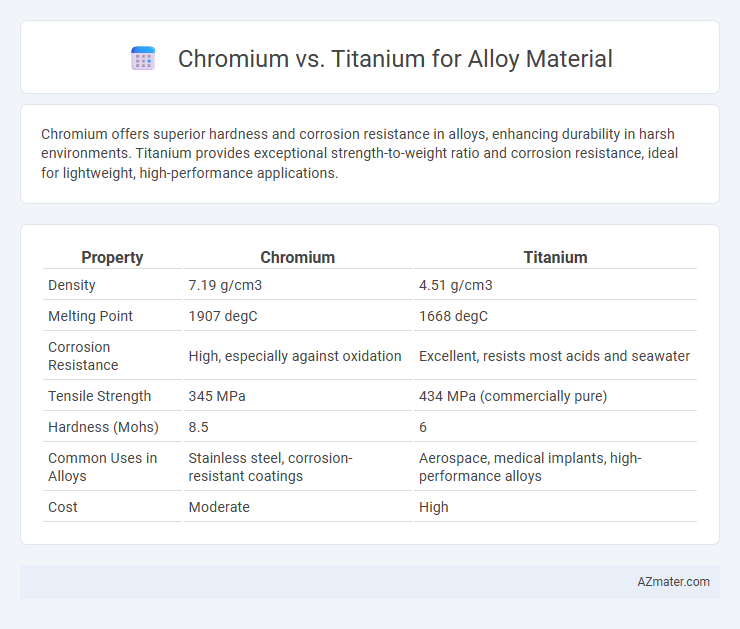Chromium offers superior hardness and corrosion resistance in alloys, enhancing durability in harsh environments. Titanium provides exceptional strength-to-weight ratio and corrosion resistance, ideal for lightweight, high-performance applications.
Table of Comparison
| Property | Chromium | Titanium |
|---|---|---|
| Density | 7.19 g/cm3 | 4.51 g/cm3 |
| Melting Point | 1907 degC | 1668 degC |
| Corrosion Resistance | High, especially against oxidation | Excellent, resists most acids and seawater |
| Tensile Strength | 345 MPa | 434 MPa (commercially pure) |
| Hardness (Mohs) | 8.5 | 6 |
| Common Uses in Alloys | Stainless steel, corrosion-resistant coatings | Aerospace, medical implants, high-performance alloys |
| Cost | Moderate | High |
Introduction to Chromium and Titanium Alloys
Chromium alloys are favored for their high corrosion resistance, hardness, and wear resistance, making them essential in stainless steel production and coating applications. Titanium alloys exhibit excellent strength-to-weight ratio, biocompatibility, and corrosion resistance, widely used in aerospace, medical implants, and marine industries. Both materials offer distinct advantages in alloy compositions, with chromium enhancing surface durability and titanium providing lightweight structural integrity.
Chemical and Physical Properties Comparison
Chromium exhibits high corrosion resistance, hardness, and a melting point of 1907degC, making it ideal for stainless steel alloys that require oxidation resistance and strength. Titanium offers exceptional strength-to-weight ratio, a melting point of 1668degC, and excellent corrosion resistance in aggressive environments, making it suitable for aerospace and biomedical applications. Both metals enhance alloy durability, but chromium alloys prioritize hardness and oxidation resistance, while titanium alloys focus on lightweight strength and biocompatibility.
Strength and Durability Differences
Chromium alloys exhibit exceptional hardness and corrosion resistance, making them ideal for applications requiring wear resistance and high tensile strength. Titanium alloys provide superior strength-to-weight ratio and outstanding fatigue resistance, ensuring durability in aerospace and medical implants. While chromium excels in surface hardness, titanium outperforms in maintaining structural integrity under cyclic loads and extreme environmental conditions.
Corrosion Resistance Capabilities
Chromium significantly enhances corrosion resistance in alloys by forming a stable, passive oxide layer that protects the metal surface from oxidizing agents and environmental degradation. Titanium exhibits exceptional corrosion resistance in aggressive environments due to its ability to develop a dense and adherent oxide film, which provides superior protection against pitting, crevice corrosion, and chlorides. Compared to chromium, titanium alloys maintain structural integrity better in highly corrosive conditions such as marine and chemical processing applications, making titanium a preferred choice where maximum corrosion resistance is critical.
Weight and Density Considerations
Chromium has a density of approximately 7.19 g/cm3, making it significantly heavier than titanium, which has a density of about 4.51 g/cm3. Titanium alloys offer superior strength-to-weight ratios, making them ideal for applications requiring lightweight yet robust materials, such as aerospace and automotive components. Weight considerations favor titanium alloys when reducing overall mass is crucial, while chromium alloys provide denser, heavier solutions suitable for wear resistance and corrosion protection.
Thermal Conductivity and Heat Resistance
Chromium exhibits lower thermal conductivity than titanium, with typical values around 93 W/m*K compared to titanium's approximately 21.9 W/m*K, making titanium superior in insulating heat. Titanium alloys demonstrate exceptional heat resistance due to a melting point near 1668degC, significantly higher than chromium's melting point at about 1907degC, enabling better performance in high-temperature environments. The combination of titanium's lower thermal conductivity and higher heat resistance contributes to its prevalent use in aerospace and high-performance automotive applications where thermal management is critical.
Cost and Availability of Chromium vs Titanium
Chromium is significantly more affordable and widely available compared to titanium, making it a cost-effective choice for alloy production. Titanium's extraction and processing involve complex procedures, contributing to its higher market price and limited supply. This disparity in cost and availability often influences material selection in industries prioritizing budget and resource accessibility.
Common Applications in Various Industries
Chromium is widely used in the automotive and aerospace industries for its excellent corrosion resistance and hardness when alloyed with steel, enhancing durability in engine components and structural parts. Titanium, favored in aerospace, medical, and marine industries, offers superior strength-to-weight ratio and biocompatibility, making it ideal for aircraft frames, surgical implants, and shipbuilding. Both metals are integral in manufacturing tools, machinery, and high-performance equipment, with chromium prioritizing wear resistance and titanium emphasizing lightweight strength.
Environmental Impact and Sustainability
Chromium and titanium alloys differ significantly in environmental impact and sustainability, with titanium offering a lower carbon footprint due to its abundant natural reserves and longer lifecycle durability, reducing the frequency of replacements. Chromium mining and processing involve higher energy consumption and toxic byproducts, posing challenges for sustainable extraction and waste management. Titanium alloys' corrosion resistance and biocompatibility contribute to sustainable applications in aerospace and medical industries, minimizing environmental degradation and enhancing resource efficiency.
Choosing the Right Alloy: Key Factors
Selecting the right alloy between chromium and titanium hinges on factors such as corrosion resistance, strength-to-weight ratio, and application environment. Titanium alloys excel in aerospace and biomedical fields due to their high strength, low density, and exceptional resistance to saltwater corrosion. Chromium alloys, commonly used in stainless steel, offer superior hardness and wear resistance, making them ideal for industrial machinery and tools exposed to high stress and oxidation.

Infographic: Chromium vs Titanium for Alloy Material
 azmater.com
azmater.com